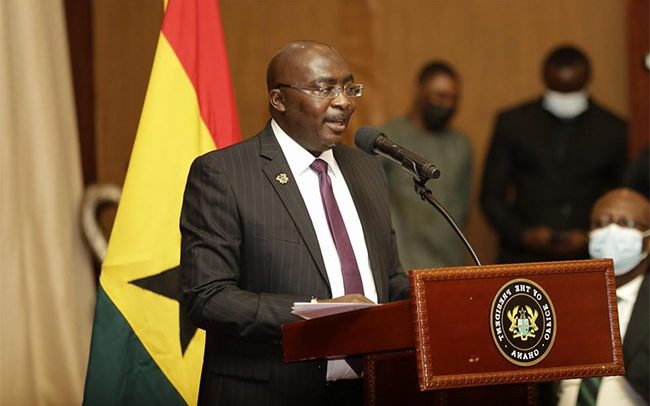Vice President Dr. Mahamudu Bawumia
VICE PRESIDENT Dr. Mahamudu Bawumia has stated that transparency is the vaccine to provide the country immunity against corruption.
According to him, corrupt people hate transparency, pointing out that it is only through transparency that the canker can be checked.
Addressing the 2022 annual conference of the Institute of Internal Auditors (IIA-Ghana) in Accra yesterday, Dr. Bawumia said the infusion of digitalisation by the Akufo-Addo-led administration in the provision of government services, as part of the fight against corruption, is beginning to yield major results.
He said the government intends to infuse greater transparency into the system in order to “shine a light into the dark recesses of corruption.”
“Building strong institutions means putting in place the right systems and practices that ensure transparency and bring about efficiency,” he noted.
“Although corruption may remain a chronic disease, transparency will be its vaccine to reduce the rate of spread. As the saying goes, our biggest disease is corruption, and the vaccine is transparency. Corrupt people hate transparency,” he emphasised.
The Vice President stated that government is “very committed” to the fight against corruption, and will continue to infuse digitalisation into the operations of state institutions to ensure more transparency.
He said government, since 2017, has deployed technology and digitalisation strategies into its operations in its quest to ruthlessly deal with the menace of bribery and corruption, adding, “We have made tremendous progress in building the digital infrastructure that serves as the bedrock for our digitalised economy, as part of the paradigm shift in our economic transformation.”
Dr. Bawumia further explained that government approached the building of the digital infrastructure on the key pillars of standardising individual identification with the use of the Ghana Card, and solving the address and property systems with the GhanaPostGPS.
He mentioned other measures as the solution of under-banking, and bringing financial inclusion to most people through robust mobile money and bank interoperability and digital payment platform; as well as the integration of government databases and digitising public service delivery using the Ghana.gov platform.
“Already, we are seeing the impacts of these initiatives, including efficient public service delivery by all ministries, departments and agencies on the Ghana.gov portal, combating corruption by removing the middle-man and ‘ghost names’ in many transactions,” he noted.
For him, this has brought more Ghanaians into the formal sector, and improved upon domestic revenue mobilisation, among others.
“If you take the Passport Office for instance, in 2017 there were about 16,000 applications for passports generating about GH¢1 million, but with the advent of digitisation, there were over 498,000 online applications in 2021, generating over GH¢56 million. Similar things are happening at the DVLA, the ports, and other institutions,” he posited.
Dr. Bawumia said the introduction of e-tickets made the country record the highest gate proceeds from a football match, intimating, “We will continue to shine the light of transparency in all aspects of national life.”
He urged the country’s internal auditors to play their part in the fight against corruption, asserting that they are instrumental in the governance structure of the country.
“As internal auditors in a digitalised economy, your ability to provide independent assurance that public sector institutions’ risk management, governance and internal control processes are operating effectively depends, first and foremost, on your embracing and adoption of digital technology. It is critical for those responsible for governance to embrace digitalisation for survival and growth,” he intimated.
“In tune with the mission of the Institute of Internal Auditors, the internal audit function must be well-positioned to help organisations accomplish their objectives by providing insight and foresight.
“This must be achieved by adopting the systematic disciplined approach to evaluate and improve the effectiveness of risk management, control and governance,” the Vice President urged.
President of IIA-Ghana, Harriet Karikari, called on institutions to invest in the continued training of their internal auditing staff to help improve on their efficiency and effectiveness in anticipating, identifying and providing remedies for any challenges.
BY Ernest Kofi Adu & Charles Takyi-Boadu

